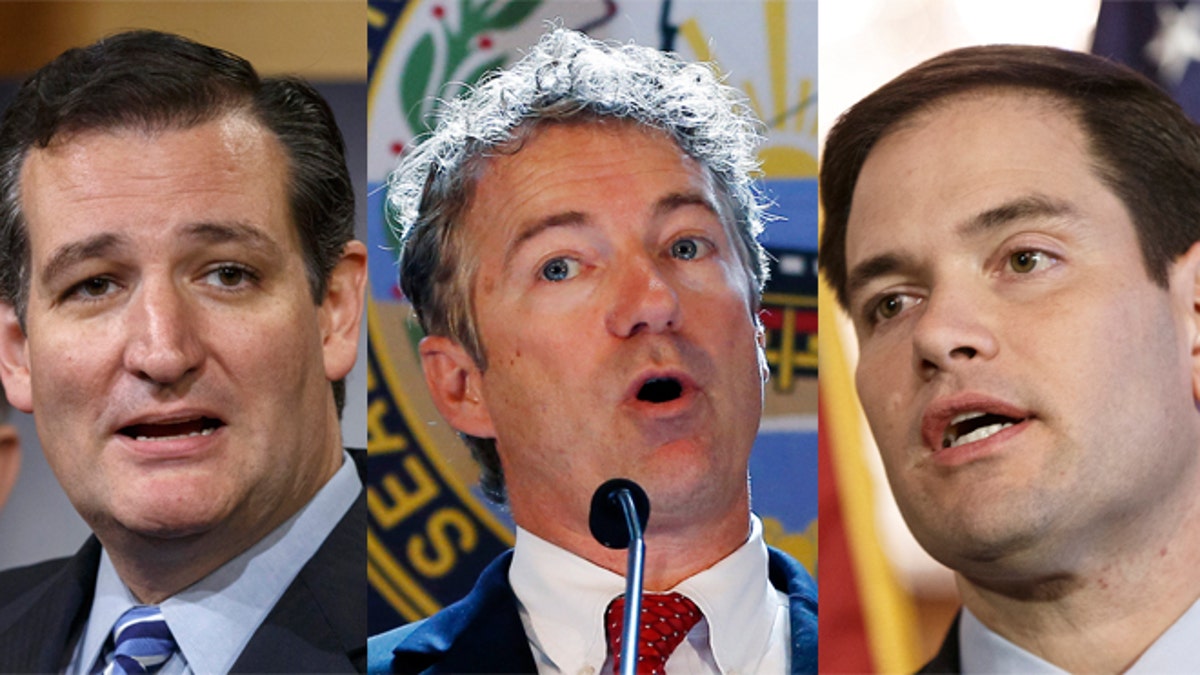
The threat posed by the Islamic State, which is often referred to by the acronyms ISIS and ISIL, is serving as a yardstick of sorts among White House wannabees and other political hopefuls, not only to gauge their knowledge of foreign policy but to display their hawkish stripes — or lack thereof.
In the case of Republican senators Ted Cruz, Marco Rubio and Rand Paul, all three have been outspoken about their views on waging military action against the terrorist organization and arming moderate rebels in Syria. While they assure their constituents that some must be done, they are split on how to handle the threat, The Hill reported.
Rubio, who has been very outspoken about foreign policy in Israel, Cuba and the Middle East, has aligned himself with a foreign policy mentality similar to that of former President George W. Bush and Sen. John McCain.
The Florida senator has said he supports arming moderate rebel factions in Syria to fight against the Islamic State and warned that the U.S. might need to have troops on the ground. While he argues that President Barack Obama should seek congressional support before embarking in further military action, he also has said that the Constitution allows him to act without Congress' consent.
Differing slightly is Texas Sen. Cruz, who has called for a more aggressive campaign to take out the terrorist group. He has urged Obama to bomb them “back to the Stone Age,” provided that he gets permission from Congress first.
Cruz opposes arming rebel factions in Syria, arguing that the weapons could end up in the hands of Islamic State or al-Qaida allies.
“Ted Cruz is probably most in line with the Republican base in the sense he doesn’t want to have a discussion of Syria versus Iraq. He wants to dismantle and destroy ISIS. Period,” GOP strategist Ford O’Connell told The Hill. “But he wants Congress to vote on it.”
Cruz has taken a more forceful role by pushing legislation that would strip citizenship from people who fight in a hostile foreign government or a foreign terrorist organization.
Of the three, Rand Paul has been the most suspicious of a U.S. intervention — a potential liability in the current climate, The Hill suggested. While he has called for “eradicating” the Islamic State and promised to vote to authorize strikes, he says arming Syrian rebels is a “mistake.” Paul also argues a Congressional vote is needed to authorize the use of military force.
Their outspoken views on foreign policy and national security have helped the three hopefuls for the 2016 presidential race to stand out above their gubernatorial counterparts.
Whit Ayres, a Republican strategist and Rubio’s pollster, told The Hill that the field of potential presidential candidates is “demonstrating a remarkable difference in knowledge about foreign affairs.”
It's not the case among governors, he notes.
“The governors are in a far worse position to be really knowledgeable about complex foreign policy matters because they don’t have to deal with them for most part in their day-to-day jobs,” he said.
Ron Kaufman, who served as White House political director to former President George H.W. Bush, said governors don’t get directly involved in foreign policy rhetoric “because it’s not their prerogative.”
“It doesn’t affect them,” he said. “Even those who are thinking of running for president in 2016, they all want to wait until after the 2014 election. Republicans have been very focused to their credit, on 2014 versus 2016.”
Follow us on twitter.com/foxnewslatino
Like us at facebook.com/foxnewslatino




